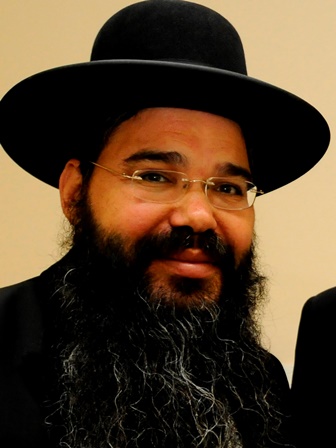The Role of "Hands" in the War Against Amalek
By: Rav Zechariah Tubi
The Midrash teaches (Yalkut Shimoni Devarim 247:25):
It is written: "Remember the Sabbath day to sanctify it" (Shemot 20:8), and it is written: "Remember what Amalek did to you." (Devarim 25:17) A cup of sweet wine is not the same as a cup of vinegar. This one (Shabbat), remember to sanctify and observe, whereas this one (Amalek), remember to kill and destroy.
This Midrash is hard to understand. What connection is there between Shabbat and Amalek, other then the word "remember," that we should compare them?!
Furthermore, the Midrash's distinction between them, that one is wine and the other vinegar, is also very difficult. Amalek is the source of evil in this world, as it says: "Amalek is the first among nations" (Bamidbar 24:20), whereas Shabbat is the source of holiness. The gap between them is tremendous, so that a comparison between wine and poison would have been more fitting. Why does the Midrash choose to minimize the difference?
There is a theme that repeats itself several times during the war against Amalek in Parshat Beshalach, that of "hands."
· On the pasuk, "Amalek came and battled Israel in Rephidim," Chazal teach: "They weakened [the grasp of] their hands ("raphu yedeihem") from the Torah." Why do Chazal refer to weakening of Torah as a weakening of the hands?
· Later on in the parsha, it says: "It happened that when Moshe raised his hand Israel was stronger, and when he lowered his hand Amalek was stronger." (17:11) It also says: "Moshe's hands grew heavy." (17:12) Why did the course of the war depend on Moshe's hands – after all, the war was being fought by Yehoshua on the battlefield?
· At the conclusion of the parsha it says: "For the hand is on the Throne of G-d: Hashem maintains a war against Amalek." (17:16) What is the hand that is on the Throne of G-d?
· "He remained with his hands in faithful prayer until sunset." (17:12) What is the connection between hands and prayer – after all, the hands are something external, while faith and prayer are more internal?
There is another point that requires clarification. After the battle, "Moshe built an altar and called its name 'Hashem is my miracle.'" (17:15) What is the nature of this altar? Moshe never sacrificed anything upon it; instead, he built it solely for the purpose of thanking Hashem for the miracle. Where do we find something of this sort?
In order to properly understand the parsha, we need to verify the underlying nature of this war. The Rambam (Sefer Hamitzvot, Mitzvah 189) writes that the war against Amalek is twofold: 1. A spiritual war within the heart. 2. A physical war. For this reason it says: "I shall surely erase ("macho emcheh") the memory of Amalek." The pasuk emphasizes the term "erase" doubly, because Amalek wanted to harm Israel in both aspects.
Amalek came to fight Am Yisrael en route, after departing Egypt, at the Rephidim way station. Why did they chose to attack there?
After the Red Sea was split, Am Yisrael attained the pinnacle of their faith: "They had faith in Hashem, and in Moshe his servant." (14:31) This faith prepared Am Yisrael for the Revelation at Sinai, where they received the Torah. Rephidim was the last stopping point before the Revelation. Amalek arrived here with the intention of harming the pure faith that Am Yisrael possessed. They desired to weaken their faith, so that Am Yisrael would not be worthy of receiving the Torah and the mitzvot. "That he happened ("karcha") upon you on the way" (Devarim 25:18) - "He cooled you down" (Rashi there). The enormous power of faith that Am Yisrael possessed during the departure from Egypt after the splitting of the Red Sea was cooled there.
However, Amalek only succeeded with the weak of faith: "He struck those of you who were hindmost, all the weaklings at your rear." (ibid.) There was no success with those who possessed a strong faith.
This is the meaning of, "They weakened their hands from the Torah." The harm that was caused to the nation's faith also harmed the nation's willingness to accept the practical side of the Torah. Hands symbolize the performance of the mitzvot, and Amalek tried to prevent Am Yisrael from achieving, "We will do and we will obey." The Zohar writes that Amalek is composed of two villains, Bilaam and Balak. Bilaam is the essence of the snake, a harm to faith. Balak is the essence of magic, a harm to mitzvah observance. This is the meaning behind Moshe's raising his hands. They were raised in order to counter the weakening of Am Yisrael's hands that occurred in Rephidim, in order to strengthen their faith, as Chazal comment (Mishna Rosh Hashana 3:8):
Do Moshe's hands win a battle or lose a battle? Rather, this tells you: So long as Israel gazed upward and subjugated their heart to their Father in heaven – they would prevail.
This is the nature of the altar that Moshe built and named, "Hashem is my miracle." Just as the tribes of Gad and Reuven constructed an altar on the other side of the Jordan in order to strengthen their faith – so, too, Moshe Rabbeinu also constructed his altar.
Shiur ID: 3671
Do you have a comment or question on the shiur?
Comment below and we'll join the discussion
Add your comments:


.jpg)


 (1).jpg)